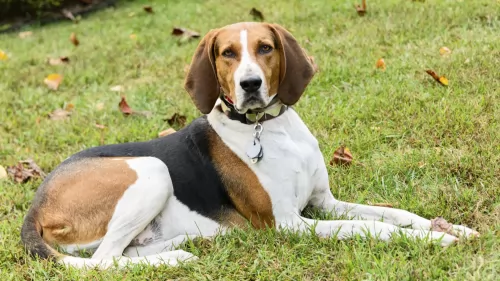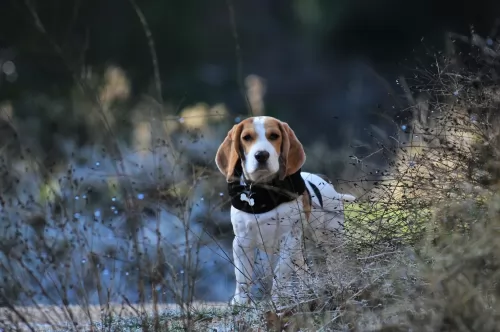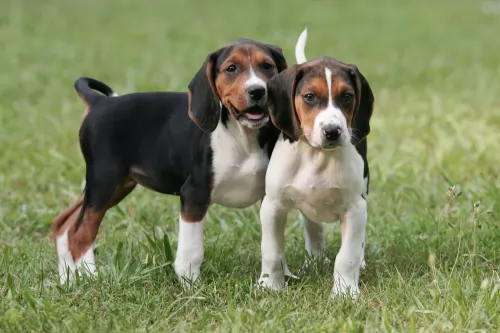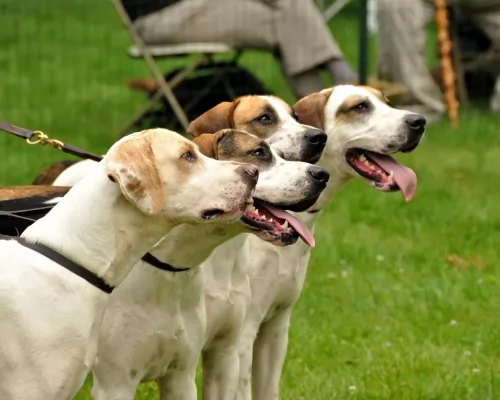 Petzlover
Petzlover American English Coonhound is originated from United States but Valley Bulldog is originated from Canada. American English Coonhound may grow 24 cm / 10 inches higher than Valley Bulldog. American English Coonhound may weigh 9 kg / 19 pounds lesser than Valley Bulldog. Both American English Coonhound and Valley Bulldog has same life span. American English Coonhound may have more litter size than Valley Bulldog. Both American English Coonhound and Valley Bulldog requires Low Maintenance.
American English Coonhound is originated from United States but Valley Bulldog is originated from Canada. American English Coonhound may grow 24 cm / 10 inches higher than Valley Bulldog. American English Coonhound may weigh 9 kg / 19 pounds lesser than Valley Bulldog. Both American English Coonhound and Valley Bulldog has same life span. American English Coonhound may have more litter size than Valley Bulldog. Both American English Coonhound and Valley Bulldog requires Low Maintenance.
 The American English Coonhound was developed in the Southern part of the United States from the variety of English hunting dogs that came to the States with the early settlers. At one point they were known as the Virginia Hound. This breed is well known for its prowess in hunting raccoons and her endurance and speed. Of course as a hound dog he loves to howl during the hunt and at home with the family. He can be frustrated and destructive if his energy and need for a job are not satisfied.
The American English Coonhound was developed in the Southern part of the United States from the variety of English hunting dogs that came to the States with the early settlers. At one point they were known as the Virginia Hound. This breed is well known for its prowess in hunting raccoons and her endurance and speed. Of course as a hound dog he loves to howl during the hunt and at home with the family. He can be frustrated and destructive if his energy and need for a job are not satisfied.
 The Valley Bulldog originates from Nova Scotia, Canada. It is thought that the Boxer, English Bulldog and the Olde English Bulldogge have been used to bring about the Valley Bulldog.
The Valley Bulldog originates from Nova Scotia, Canada. It is thought that the Boxer, English Bulldog and the Olde English Bulldogge have been used to bring about the Valley Bulldog.
 The American English Coonhound is an athlete with a deep chest and cute face. They have broad heads, domed skulls, dark eyes and soft, low ears. They are as fast and athletic as they look. These are highly athletic dogs with long legs and a slim but muscular body. They are so well built for their hunting role, that any deficiencies are quickly identified and bred out of the breed.
The American English Coonhound is an athlete with a deep chest and cute face. They have broad heads, domed skulls, dark eyes and soft, low ears. They are as fast and athletic as they look. These are highly athletic dogs with long legs and a slim but muscular body. They are so well built for their hunting role, that any deficiencies are quickly identified and bred out of the breed.
 The Valley Bulldog stands at between 36 and 46cm in height and he weighs in the region of 18 – 36kg. He is actually a taller version of an English Bulldog.
The Valley Bulldog stands at between 36 and 46cm in height and he weighs in the region of 18 – 36kg. He is actually a taller version of an English Bulldog.
He is muscular and sturdy and has the true broad head of which the Bulldog is so familiar. He has small to medium floppy ears and a stump of a tail. He also has the flat muzzle.
The dog’s coat is short and smooth, making him fairly low maintenance, although he is a moderate shedder. It comes in typical Bulldog shades – tan, white, red, black and brindle.
The Valley Bulldog has an excellent nature, being completely non-aggressive, and when he has been trained and socialized you get a superb pet.
He’s intelligent so you won’t have any trouble learning any basic commands. He is able to get along with other pets in the home. He can be quite entertaining too as he becomes clownish, loving to be around his human family. He is also capable of being calm and gentle.
He makes a splendid playmate for children, loving the games as he is quite an energetic dog. He isn’t suited to life in a tiny home in the city because he loves to just run sometimes, and then he can be like a bull in a china shop.
 The American English Coonhound knows how to relax just as much as he knows how to work. He is mellow after work and tenacious in the chase. This is not the dog for a first-time owner. They are stubborn and hard to train. They howl and bark at home as much as they do on the hunt. They need a strong pack leader, especially when living in the city or neighborhoods.
The American English Coonhound knows how to relax just as much as he knows how to work. He is mellow after work and tenacious in the chase. This is not the dog for a first-time owner. They are stubborn and hard to train. They howl and bark at home as much as they do on the hunt. They need a strong pack leader, especially when living in the city or neighborhoods.
They are outgoing and friendly and very sensitive. They mature later than most other breeds their size. They are about 2 when they mature.
 The Valley Bulldog is guaranteed to make you a splendid pet because he has such a sweet temperament.
The Valley Bulldog is guaranteed to make you a splendid pet because he has such a sweet temperament.
He is such a social, playful dog too. Because of his intelligence, you won't have any trouble teaching him some basic commands. You’ll be amused and entertained by this wonderful dog in your life as his warm personality will ensure you have a true friend in him.
 If kept active and happy, the American English Coonhound has very few health problems. The benefit from a large gen pool but do have some health concerns including elbow and hip dysplasia, ear infections, cataracts, bloat, and Progressive Retinal Atrophy. They do have a tendency to gain weight as they age. These issues will be addressed in more detail below. DNA testing is available for the dysplasia and eye issues.
If kept active and happy, the American English Coonhound has very few health problems. The benefit from a large gen pool but do have some health concerns including elbow and hip dysplasia, ear infections, cataracts, bloat, and Progressive Retinal Atrophy. They do have a tendency to gain weight as they age. These issues will be addressed in more detail below. DNA testing is available for the dysplasia and eye issues.
 It can be sad watching a dog becoming less mobile as joint problems set in. The vet can recommend a diet which can help to manage joint disease. Also, the pain associated with joint problems can be debilitating for your pet and you will want to get your pet to the vet so the pain can be managed.
It can be sad watching a dog becoming less mobile as joint problems set in. The vet can recommend a diet which can help to manage joint disease. Also, the pain associated with joint problems can be debilitating for your pet and you will want to get your pet to the vet so the pain can be managed.
These dogs have quite a few folds around the face and these areas need to be kept clean and dry. An overweight Valley Bulldog should be avoided at all costs as this can put additional weight on the joints.
This is a Brachycephalic breed so they tend to battle with breathing, particularly when they are stressed, agitated or hot. Sometimes these dogs will even gag so as to clear their airway.
Watch for coughing and choking. Such difficulties can be life-threatening for your Valley Bulldog so it is important to recognize respiratory problems with your dog.
 your working American English Coonhound needs different food than one who is not working. So, if you hunt with your dog remember he really needs the calories to keep his energy up. However, they can get obese as they age so cut back with less activity and more years. Watch the number of treats when training.
your working American English Coonhound needs different food than one who is not working. So, if you hunt with your dog remember he really needs the calories to keep his energy up. However, they can get obese as they age so cut back with less activity and more years. Watch the number of treats when training.
Elbow and Hip Dysplasia – the joint issues prevent the bones from connecting and functioning properly. Any good breeder of American English Coonhounds will do tests for both.
Eye issues range from cataracts to PRA (Progressive Retinal Atrophy) Again there are tests available for these conditions.
Bloat is a condition many medium to large size dogs can experience when their stomach can become inverted and intestines distended. The is a situational issue and can’t be predicted. Don’t allow your coonhound to wolf down food right before exercise and feed him more than once a day in a smaller meal.
The American English Coonhound needs a lot of exercise and has an extremely strong work and prey drive.
 You need to be careful with a bulldog as they have sensitive stomachs and are prone towards indigestion and flatulence. They will certainly need to avoid some foods and you also want to avoid obesity at all costs. The wrong foods can also cause allergic reactions as well as dermatitis which can be very painful and frustrating.
You need to be careful with a bulldog as they have sensitive stomachs and are prone towards indigestion and flatulence. They will certainly need to avoid some foods and you also want to avoid obesity at all costs. The wrong foods can also cause allergic reactions as well as dermatitis which can be very painful and frustrating.
If you have a Valley Bulldog, for your own peace of mind, speak to your veterinarian or a dog expert about the best foods for a bulldog and also the amount to feed. There are some foods that are totally toxic to bulldogs. Make sure your Valley Bulldog always has a bowl of fresh, cool water available that is easy to reach.
Have grooming sessions with your bulldog where you check inside his ears, inside his mouth for bad teeth and check his eyes and face. His nails will also need to be trimmed.
These dogs are more active than you think but you need to be careful that the exercise isn’t too strenuous. He isn’t the kind of dog that will do well with running next to you as you cycle.
Rather take him on a walk every day and give him some ball games in the garden where you can throw him a ball or allow him to pull on a rope.